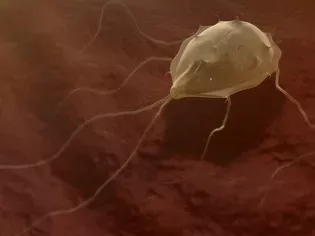Giardiasis in Cats
Updated on 04/26/24

Giardiasis in Cats: A Comprehensive Guide to Diagnosis, Treatment, and Prevention
Introduction:
Giardiasis is a common parasitic infection that affects cats of all ages. It is caused by a microscopic parasite called Giardia duodenalis, which infects the intestines and can cause a variety of gastrointestinal symptoms. While giardiasis is not typically life-threatening, it can be uncomfortable and lead to dehydration if left untreated.
Symptoms of Giardiasis in Cats:
The most common symptom of giardiasis in cats is diarrhea. The diarrhea can be intermittent or persistent, and it may range from mild to severe. Other symptoms of giardiasis can include:
* Vomiting
* Loss of appetite
* Weight loss
* Lethargy
* Abdominal pain
* Gas
* Dehydration
Diagnosis of Giardiasis:
Giardiasis can be diagnosed by a veterinarian through a fecal examination. A fecal examination involves examining a sample of your cat's feces under a microscope to look for Giardia cysts. Giardia cysts are the eggs of the parasite, and their presence in the feces indicates that your cat has giardiasis.
Treatment of Giardiasis:
Giardiasis is treated with medication prescribed by a veterinarian. The medication is typically an anti-parasitic drug that kills the Giardia cysts. Treatment usually lasts for 5-7 days, and it is important to complete the entire course of medication to ensure that all of the cysts are killed.
Prevention of Giardiasis:
There are a number of things you can do to prevent your cat from getting giardiasis, including:
* Keeping your cat indoors
* Preventing your cat from drinking from contaminated water sources
* Washing your hands thoroughly after handling your cat or cleaning up after them
* Regularly cleaning and disinfecting your cat's litter box
* Deworming your cat regularly
Examples of Giardiasis in Cats:
Here are some examples of how giardiasis can affect cats:
* A 2-year-old cat named Mittens presented to the veterinarian with a history of intermittent diarrhea. The cat had been otherwise healthy, but the diarrhea had been going on for several weeks. The veterinarian performed a fecal examination and found Giardia cysts in the feces. Mittens was treated with medication, and the diarrhea resolved within a few days.
* A 6-month-old kitten named Whiskers was brought to the veterinarian with a history of severe diarrhea and vomiting. The kitten was lethargic and had lost weight. The veterinarian performed a fecal examination and found Giardia cysts in the feces. Whiskers was treated with medication and fluids, and he recovered from giardiasis within a few weeks.
Conclusion:
Giardiasis is a common parasitic infection that can affect cats of all ages. It is important to be aware of the signs and symptoms of giardiasis, and to seek veterinary care if you suspect that your cat may have the infection. Giardiasis is treated with medication, and it is important to complete the entire course of treatment to ensure that all of the cysts are killed. There are a number of things you can do to prevent your cat from getting giardiasis, including keeping your cat indoors, preventing your cat from drinking from contaminated water sources, and regularly cleaning and disinfecting your cat's litter box.
Explore More Pets

Cat Behavior Problems
How to Stop Aggression in Kittens

Long-Haired Cat Breeds
Siberian Cat: Breed Profile, Characteristics, & Care

Cat Behavior Problems
How to Stop Kittens From Scratching and Biting

Long-Haired Cat Breeds
Turkish Angora: Cat Breed Profile, Characteristics & Care

Basic Training
How to Socialize Your Kitten

Short-Haired Cat Breeds
Cute Pictures & Facts About Calico Cats & Kittens

Litter Box Training
Training Your Kitten to Use the Litter Box

Long-Haired Cat Breeds
10 Fun Facts About White Cats